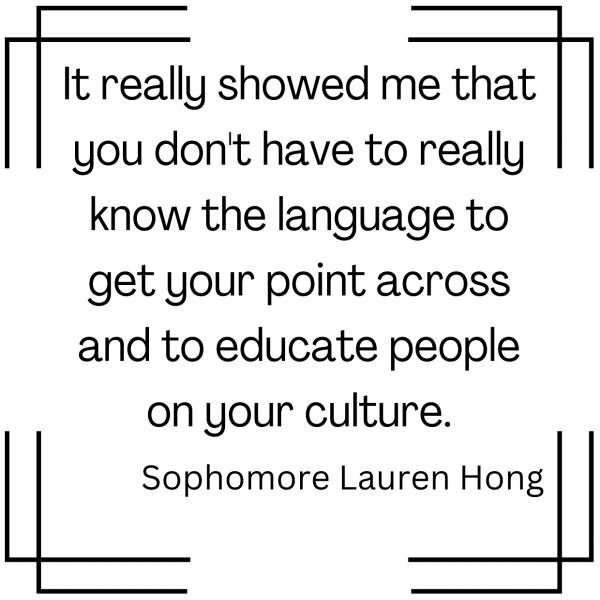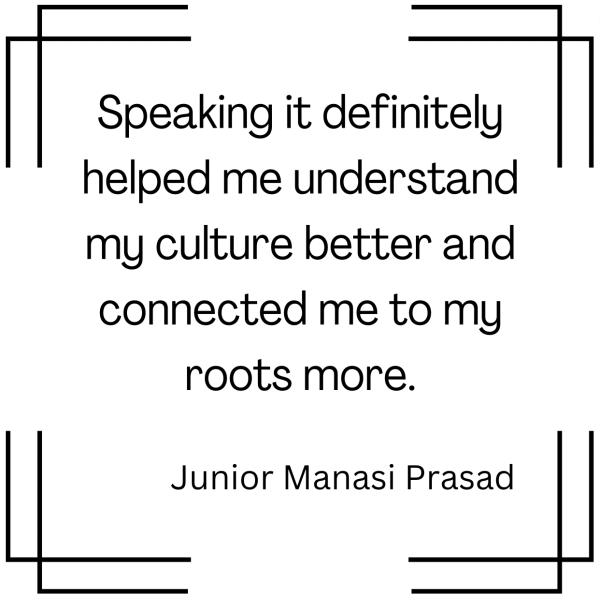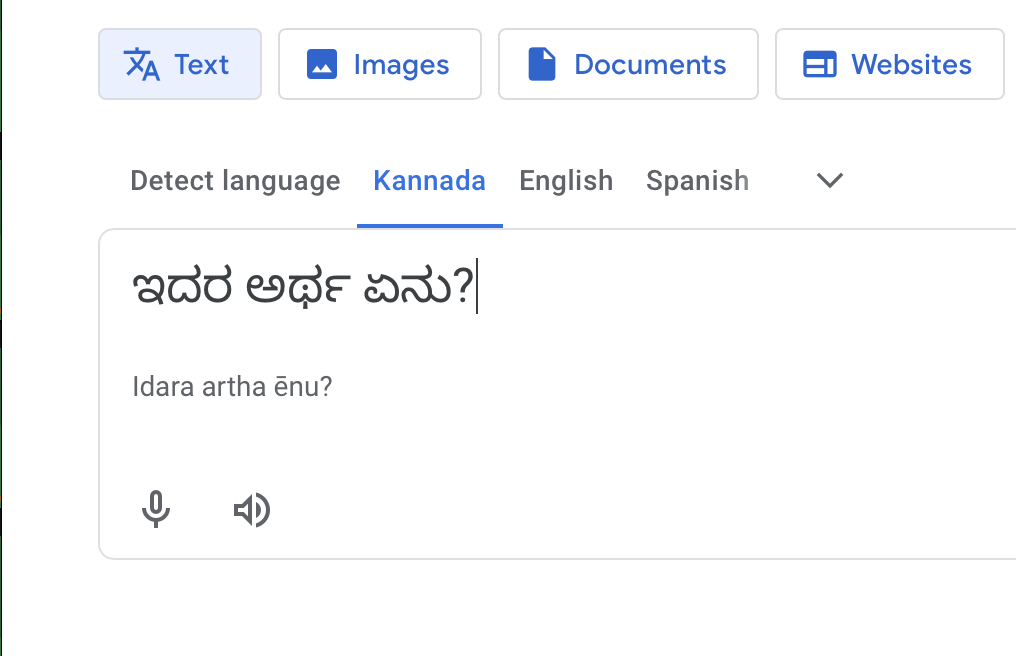Sophomore Ronith Vinod Chikkaballapur finds himself pulling out his cell phone more often to translate what his parents, who are speaking in Kannada, are saying in English. After moving away from Karnataka, India when he was nine years old, Chikkaballapur finds his grasp on Kannada, the language he’d been speaking since he was two, dwindling away due to the increasing amount of English surrounding him.
“You end up talking in English to your siblings,” Chikkaballapur said. “You end up getting better at English a lot and you end up speaking it much more often. It does impact my conversation with my parents, for example, when I’m talking to my parents, sometimes I end up forgetting the word and being like, ‘Oh, I know what the word is in English, but I don’t know what it’s in Kannada.’ It does feel like I have lost a bit of language and it slightly impacts my conversation with my parents.”
At his school in India, the majority of students spoke English, so Chikkaballapur hasn’t seen much difference in his education. He finds the biggest challenge is in day to day communication with his parents and extended family, which he says can be frustrating.
“If I ever forget a word, I just go to Translator and put the word in English and I listen to what it sounds like in Kannada,” Chikkaballapur said. “I didn’t do this in India at all. But here I’m just forgetting a couple of words. I end up having to do that. It is sad when I have to Google the word.”
On the other hand, sophomore Lauren Hong, who doesn’t speak Cantonese and Vietnamese, which her extended family uses, rarely feels sadness towards her inability to speak them. However, she finds frustration in the way she’s perceived because of her identity.
“A lot of my classmates, sometimes they ask me, ‘Oh, can you help me with my Chinese homework?’ and I feel so bad because I can’t really help them and they did kind of just assume,” Hong said.
Through her experiences surrounding Cantonese and Vietnamese, Hong has learned that she doesn’t necessarily need to speak them to connect with her culture and her family. She’s found other ways of communication to make memories.
“What I remember specifically was going to the Vietnamese temple for the first time and the people that were working there didn’t speak English very well, but they made an effort to make sure that we understood what we were doing,” Hong said.  “It really showed me that you don’t have to really know the language to get your point across and to educate people on your culture.”
“It really showed me that you don’t have to really know the language to get your point across and to educate people on your culture.”
Despite her lack of a second language not bothering her, Hong believes she’d like to eventually learn Cantonese one day. Chikkaballapur agrees and plans to strengthen his knowledge of Kannada in order to remain connected with his culture while in a different country.
“So I think language is a big part of culture,” Chikkaballapur said. “If you don’t know the language, it’s really really hard to experience the culture, figure out what people are talking about and figure out what people are doing. So I think language is like a huge part of getting in touch with people’s cultures.”
Like Chikkaballapur, junior Manasi Prasad also uses language as a way to connect to her culture. However, she uses her first language, Tamil, on a larger scale, finding herself using it both at school and at home.
“And Tamil’s my mother tongue so it helps me communicate with my family members that don’t know English that well,” Prasad said. “I mean, we can connect to more songs and cultural references.”
Tamil, like many other languages, doesn’t translate exactly into English all the time. Often, multiple words in Tamil are condensed into one in English, making it more difficult to clearly communicate what one means. Speaking Tamil with a larger group of people also helps Prasad bypass this problem and emphasize what she wants to say.
“Golu versus silambu. In English they’re both anklets, but they’re different,” Prasad said. “One is a thick hollow bracelet with a bunch of jewels inside it, which makes it jingle and then golu would be like an anklet again, but has bells on the outside so it kind of makes noise that way. Both of them make noise, but not like Western anklets.”
Although all three have had different experiences with language, one thing they collectively agree upon is that culture plays a large role in their life and staying connected to that is vital for them. To Hong, language isn’t a player in that, and instead she connects through celebrating holidays with her family.
“Every time Lunar New Year rolls around, we all get together and we have a lot of Chinese food. For my other grandparents, they live a little farther. I always call them and I make sure that I wish them Happy Lunar New Year,” Hong said. “And eventually one day I do want to go to China and see the Great Wall and everything. And I feel like for that I definitely have to travel with either someone that does know the language or I need to learn a little bit to get my way across.”
In Chikkaballapur’s case, his language allows him to connect with cultural ideas and practices from India. It serves as a way to link his identity with his parents’ as well.
“It symbolizes tradition and culture,” Chikkaballapur said “Because I came from Karnataka, India, culture there was to speak in Kannada, or have Kannada as your mother tongue. I want to maintain that with my parents. I want to maintain the culture of speaking in Kannada.”
And to Prasad, speaking in Tamil brings up memories and a level of familiarity and comfort she says is difficult to find elsewhere. It’s more than a language to her — it’s her roots.
“It’s not just another random language, it’s something personal,” Prasad said. “When my grandma was teaching me Tamil or trying to get me to talk in Tamil and she majored in English but she pretended to not know English
so I would learn Tamil. And she’s like, ‘Oh, what’s cat in English and stuff like that?’ It’s familiar, I guess, familiarity and comfort because it’s my mother tongue and my family speaks it. Speaking it definitely helped me understand my culture better and connected me to my roots more.”
Language can be an impactful and important part of one’s life. It doesn’t have to be, though. According to Hong, language is everything from communication to memories, and even without it, one can make incredibly special memories.
“I think that you don’t have to speak the language to really understand what the culture is all about and how, how they do different things and how they celebrate things,” Hong said. “I think it is kind of a big part of it but that doesn’t mean you can’t celebrate and have fun and do the same things that everyone else is doing.”











